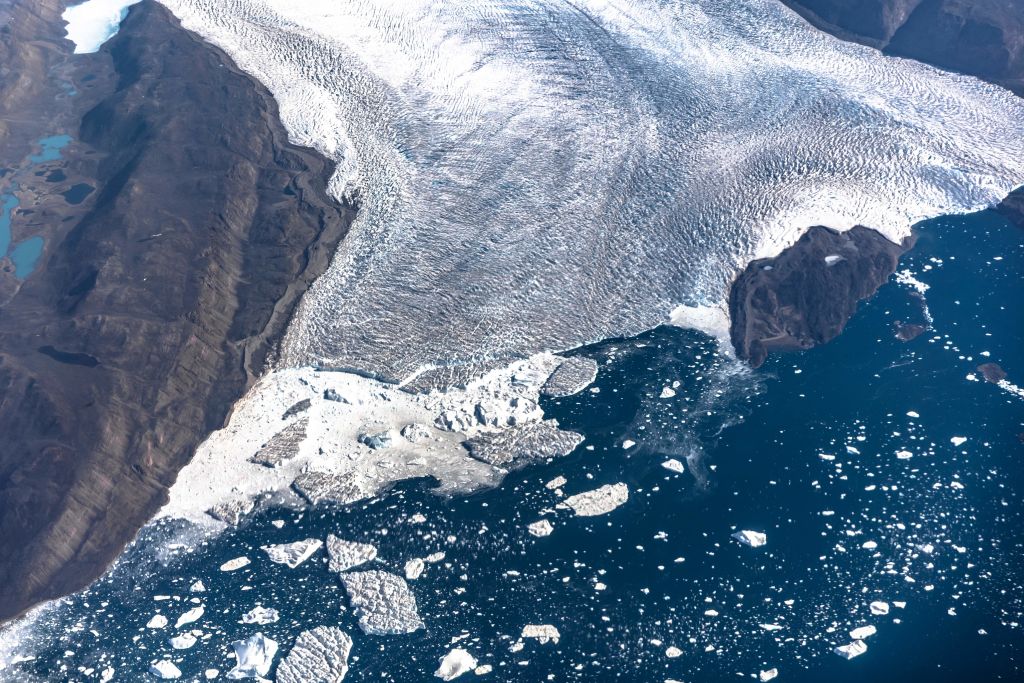Ice sheets in Greenland and Antarctica are melting at a 'disastrous' pace


A free daily email with the biggest news stories of the day – and the best features from TheWeek.com
You are now subscribed
Your newsletter sign-up was successful
The Greenland and Antarctic ice sheets are melting three times faster than 30 years ago, according to research published in the journal Earth Science System Data. The worst melt was in 2019, when the ice sheets lost a combined 675 billion tons, CNN writes.
"This is a huge amount of ice," study lead author Inès Otosaka told CNN. "This is very worrying, of course, because 40 percent of the global population lives in coastal areas." The Greenland sheet has particularly suffered, with study co-author Ruth Mottram calling the figures "disastrous," per The Associated Press.
But Antarctica's melt is likely to have more devastating impacts around the world, AP says. "While mass loss from Greenland is outpacing that from Antarctica, there are troublesome wild cards in the south, notably behavior of the Thwaites glacier," also known as the Doomsday Glacier, Mark Serreze, director of the U.S. National Snow and Ice Center, told AP. Most of the melt in Antarctica is coming from this glacier and is predicted to cause sea levels to rise globally including as far north as Texas, per NPR.
The Week
Escape your echo chamber. Get the facts behind the news, plus analysis from multiple perspectives.

Sign up for The Week's Free Newsletters
From our morning news briefing to a weekly Good News Newsletter, get the best of The Week delivered directly to your inbox.
From our morning news briefing to a weekly Good News Newsletter, get the best of The Week delivered directly to your inbox.
"We have what we call some low-probability but high-impact mechanisms that could be triggered if we exceed a certain level of warming," Otosaka told CNN. Rising temperatures due to climate change are responsible for the melting and will lead to a number of irreversible ecological consequences. Each half-degree of temperature rise also greatly exacerbates the issue.
"This is a devastating trajectory," Twila Moon of the National Snow and Ice Center told AP. "These rates of ice loss are unprecedented during modern civilization."
A free daily email with the biggest news stories of the day – and the best features from TheWeek.com
Devika Rao has worked as a staff writer at The Week since 2022, covering science, the environment, climate and business. She previously worked as a policy associate for a nonprofit organization advocating for environmental action from a business perspective.
-
 The ‘ravenous’ demand for Cornish minerals
The ‘ravenous’ demand for Cornish mineralsUnder the Radar Growing need for critical minerals to power tech has intensified ‘appetite’ for lithium, which could be a ‘huge boon’ for local economy
-
 Why are election experts taking Trump’s midterm threats seriously?
Why are election experts taking Trump’s midterm threats seriously?IN THE SPOTLIGHT As the president muses about polling place deployments and a centralized electoral system aimed at one-party control, lawmakers are taking this administration at its word
-
 ‘Restaurateurs have become millionaires’
‘Restaurateurs have become millionaires’Instant Opinion Opinion, comment and editorials of the day
-
 How climate change is affecting Christmas
How climate change is affecting ChristmasThe Explainer There may be a slim chance of future white Christmases
-
 Blue Origin launches Mars probes in NASA debut
Blue Origin launches Mars probes in NASA debutSpeed Read The New Glenn rocket is carrying small twin spacecraft toward Mars as part of NASA’s Escapade mission
-
 Why scientists are attempting nuclear fusion
Why scientists are attempting nuclear fusionThe Explainer Harnessing the reaction that powers the stars could offer a potentially unlimited source of carbon-free energy, and the race is hotting up
-
 Dinosaurs were thriving before asteroid, study finds
Dinosaurs were thriving before asteroid, study findsSpeed Read The dinosaurs would not have gone extinct if not for the asteroid
-
 Canyons under the Antarctic have deep impacts
Canyons under the Antarctic have deep impactsUnder the radar Submarine canyons could be affecting the climate more than previously thought
-
 SpaceX breaks Starship losing streak in 10th test
SpaceX breaks Starship losing streak in 10th testspeed read The Starship rocket's test flight was largely successful, deploying eight dummy satellites during its hour in space
-
 NASA is moving away from tracking climate change
NASA is moving away from tracking climate changeThe Explainer Climate missions could be going dark
-
 Rabbits with 'horns' sighted across Colorado
Rabbits with 'horns' sighted across Coloradospeed read These creatures are infected with the 'mostly harmless' Shope papilloma virus
